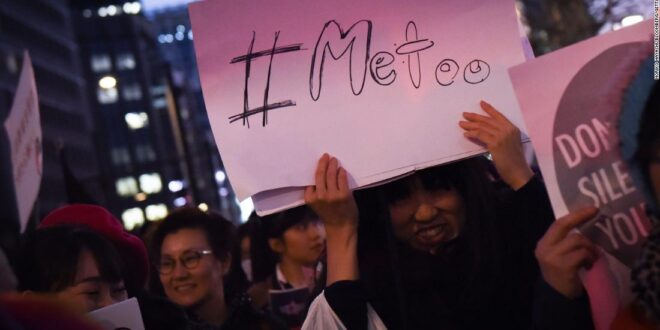Shoko Arai, 51, was voted out on Sunday in Kusatsu, which is known for its pure scorching springs and resorts. The dismissal request claimed Arai’s allegations had “degraded” the ladies of the Gunma prefecture city.
In whole, 92% of votes lodged demanded her removing, in accordance with Kusatsu officers.
The controversy started in November final 12 months, when Arai revealed an e-book claiming she had been pressured right into a sexual relationship with the city’s mayor, Tadanobu Kuroiwa.
A movement to fireplace the mayor was voted down, and Arai was expelled from the meeting a month later. Nonetheless, the expulsion was appealed, and in the end reversed by the prefecture.
After she was reinstated, a gaggle of 19 residents led by council chairman Takashi Kuroiwa despatched a dismissal request to the council, prompting the residential referendum that unseated Arai final weekend.
The dismissal request additionally claimed that Arai’s statements to media in regards to the assault allegations had damage Kusatsu’s popularity. It pointed to a number of particular remarks Arai had made, together with ones that city girls had been “handled as objects,” and that girls typically grew to become mistresses to highly effective male resort homeowners to achieve privileges.
The request identified that the mayor had denied the allegations, and Arai’s wage as a council member was a “waste” of taxpayer cash.
In an official response to the council, Arai stated the mayor and different council members calling for her removing had been those damaging the city’s dignity and popularity.
Her ousting on Sunday has pushed the resort city into the nationwide highlight. Because the weekend, the city corridor has acquired dozens of calls criticizing Arai’s dismissal, largely coming from exterior the city, stated Kusatsu official Kenji Hagiwara. Many callers known as the choice unfair and sexist.
“That is an unprecedented state of affairs,” Hagiwara instructed CNN. “We fear the picture of this city is broken.”
Sexism and energy in Japan
The hole widens additional in politics. As of October this 12 months, 46 of 465 decrease home lawmakers in Japan had been girls. That is fewer than 10%, in comparison with a 25% international common.
However seven years on, the marketing campaign has had restricted success, with gender discrimination and inequality nonetheless rife. The #MeToo motion led to concrete progress in different nations and a shift in cultural dialog — nevertheless it was met with resistance in Japan.
In a case that gained worldwide consideration in 2017, freelance journalist Shiori Ito alleged a high-profile journalist had invited her to dinner two years prior, after which raped her.
The response was removed from supportive — she acquired threats, backlash on social media, and even fled Japan, fearing for her and her household’s security. Even authorities tried to discourage her from pursuing authorized motion, she stated.
The win was celebrated by her supporters as a step towards justice — however “a win does not wipe away every little thing that occurred,” she instructed reporters after the ruling. “I must face my emotional scars from now. This isn’t the top.”
Correction: This story has been up to date to mirror that Tadanobu Kuroiwa is the mayor of Kusatsu, and Takashi Kuroiwa is council chairman.
CNN’s Emiko Jozuka contributed to this report.
 Top Naija News – Nigeria News, Nigerian News & Top Stories Top Naija News – Nigerian Newspapers, Nigerian News. topnaijanews is a daily Nigerian newspaper covering Latest News, Breaking News, Entertainment, Sports, Lifestyle and Politics.
Top Naija News – Nigeria News, Nigerian News & Top Stories Top Naija News – Nigerian Newspapers, Nigerian News. topnaijanews is a daily Nigerian newspaper covering Latest News, Breaking News, Entertainment, Sports, Lifestyle and Politics.




